Copenhagen shooter: Omar came out of prison wanting to wage holy war says pal
Source: mirror.co.uk
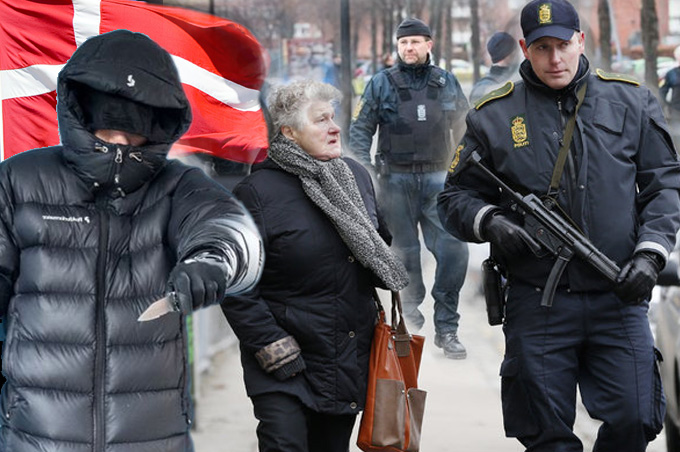
Comment: Isn't multiculturalism and forced diversity a wonderful thing? Really, when you think about it, we've haven't had this kind of "vibrance" in Scandinavia for a few decades. Exciting. New. Spicy!
But hey Euroman, the important thing to remember when you read articles like this the one below is: "Don't forget to stand with Israel." If you don't, you of course have to take a position that denies the obvious and you have to continue to delude yourself that somehow these imported conflicts are good for Denmark.
Can you imagine the resources, coming out of the pocket of the Dane, that now is going to be spent on terrorism prevention, surveillance, militarization of the police and many other new exciting protocols that are going to be deployed to spicy up the life of those boring White Danes. Finally they can be dragged into the 21st century.
"Prislam" as it's called is now coming to Scandinavia. A Research report from 2007 by Thomas Precht released by the Danish Ministry of Justice called Home grown terrorism and Islamist radicalisation in Europe does examine this known growing problem in Denmark and Europe. Predictably nothing has done about it, despite that Omar was known to police, predictably the guard was let down.
The point is not to stop immigration and try to minimize the imported ethnic conflicts in Denmark. No no no, the state will exacerbate the problem by continuing like nothing is going on and at the same time they somehow seek to act as a third party mediator between these middle eastern conflicts and "convert" these lost young teenagers to the wholesome virtues that the west has to offer. Like Horrible Bosses 2, pornography and Iggy Azalea.
Omar, the Palestinian shooter, must not think that Danes are taking a big enough beating from Israel to show their support:
In conclusion, it's obvious that those damn Danes are the real problem in this world.
Below article is form mirror.co.uk:
Danish Jihadist's pal says the shooter was radicalised when he went to prison as a gang member.
The jihadi gunman who murdered two innocent people in Denmark was radicalised while serving time in jail for a violent knife attack, his best pal claims.
Omar Abdel Hamid El-Hussein was a serial crook and belonged to the ruthless Brothas gang that ruled some of the toughest estates in Copenhagen.
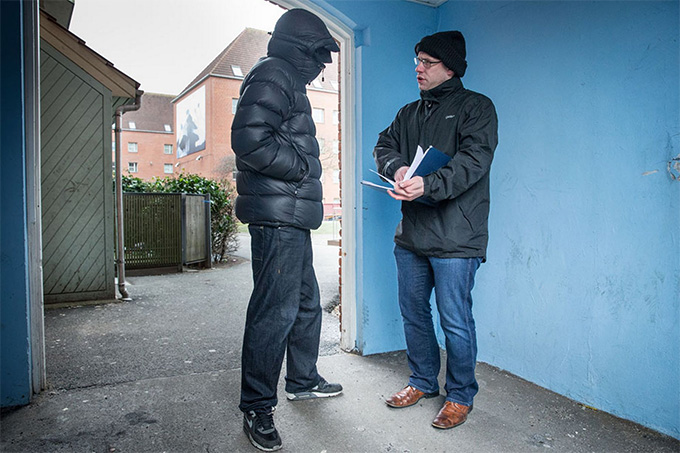
Mirror reporter David Collins speaks to gang member
But even fellow members were shocked by his bloody lone wolf rampage in the name of Islamic State at the weekend – which came just two weeks after he was freed from prison.
El-Hussein’s childhood friend and Brothas leader Abo Saddam, 24, said: “He went into prison a gang member, one of us. A petty criminal I suppose. He came out wanting to wage a holy war.
“I don’t know who he spoke to in jail but he must have made friends with other Muslims who made him the way he was when he came out.
“Prison changed him. He became a much harder Muslim with more hardcore beliefs. Not only that but he wanted to act on those beliefs as well, instead of just talking about them.
“I have known Omar my entire life. I have fought side by side with him. We smoked hashish together. But the person who came out of that jail was not Omar. It was someone else. He was inspired by the Charlie Hebdo attacks, I am sure of it. Anyone who makes a mockery of Islam deserves to die.”
Danish-born El-Hussein, 22, shot dead film director Finn Noergaard, 55, during a talk on free speech at a cafe on Saturday. He later blasted 37-year-old Jewish security guard Dan Uzan in the head outside a synagogue in the city.
It is believed the intended target of the cafe attack was controversial Danish cartoonist Lars Vilks who was speaking at the event and has previously drawn the Prophet Muhammad as a dog.
The attack is thought to have been inspired by last month’s murders of 17 people by jihadi gunmen at the Charlie Hebdo satirical magazine and a kosher supermarket in Paris.
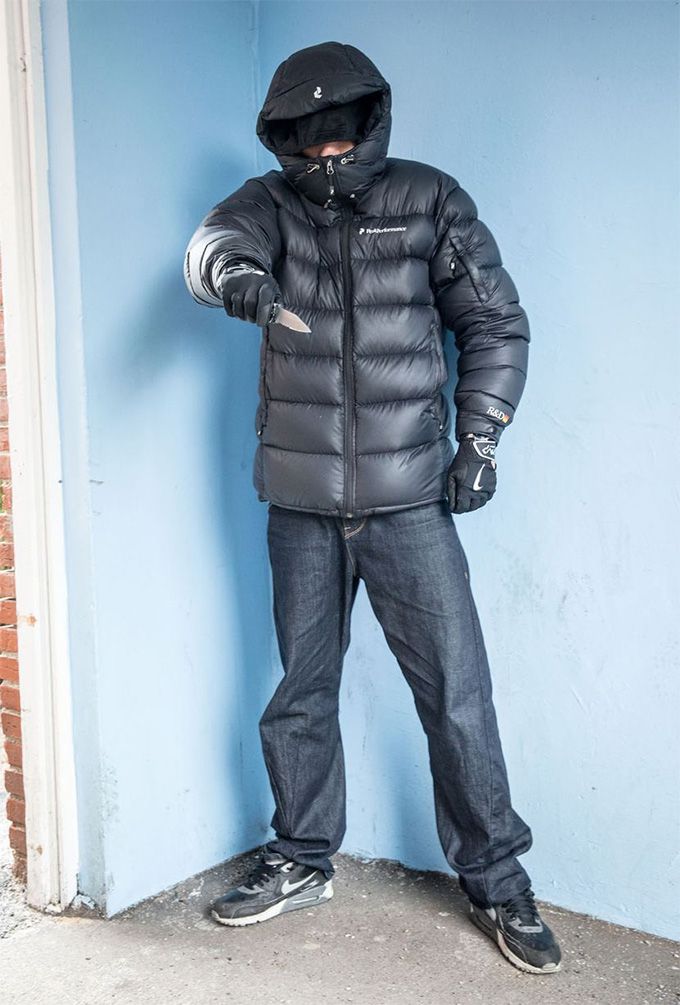
Gang member Abo saddam
Moments before Saturday’s slaughter El-Hussein, who was shot dead by police after they tracked him to a block of flats on Sunday, updated his Facebook profile swearing allegiance to Islamic State. He also posted a video featuring a hymn about holy war.
Danish intelligence chief Jens Madsen acknowledged El-Hussein had been “on the radar” of his services due to him showing radical beliefs while in jail, where he was serving two years for stabbing a 19-year-old man on a train. Muslim Abo told how the Brothas gang despise Jews. After leading us to a passageway on an estate in the rough Norrebro neighbourhood, he placed several gang members on lookout duty for police.
Pulling a knife from the pocket of his jacket he declared: “If I saw a Jewish person in the street I would stab him. They are bullies and so I will bully them. It was the same for Omar. His family are from Palestine. They hate Israel for what they have done to the people of Gaza. We all do.”
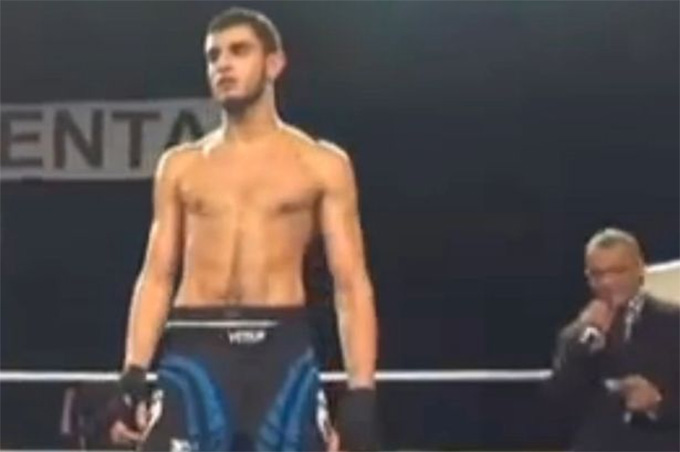
Omar Abdel Hamid El-Hussein during his kickboxing days
UK prison authorities are also struggling with the problem of Islamic gangs in jail. There are now nearly 12,000 Muslim prisoners. In 1997 it was less than 4,000. In 2012 a report into radicalisation at Whitemoor jail, Cambridgeshire, told how prisoners said it was a “Taliban recruiting ground”. Staff were afraid to walk on certain wings. The same year a report on Belmarsh prison in South East London revealed an inmate was persuaded by an al-Qaeda lag to join a terror training camp in Yemen just three days after leaving jail.
Hundreds of British Muslims have flocked to Turkey to cross the border into Syria to join IS, a vile medieval regime which stones women for adultery and throws gay people from the tops of buildings.
Abo said he was surprised El-Hussein moved from petty crime to Islamic murderer as the Brothas are not a gang drawn to prowling terror chiefs.
He added: “Omar was not a clueless estate kid. He was one of the brightest at his school. He was fluent in English. He was a champion kickboxer and trained hard and entered fights. He dreamed of turning professional.
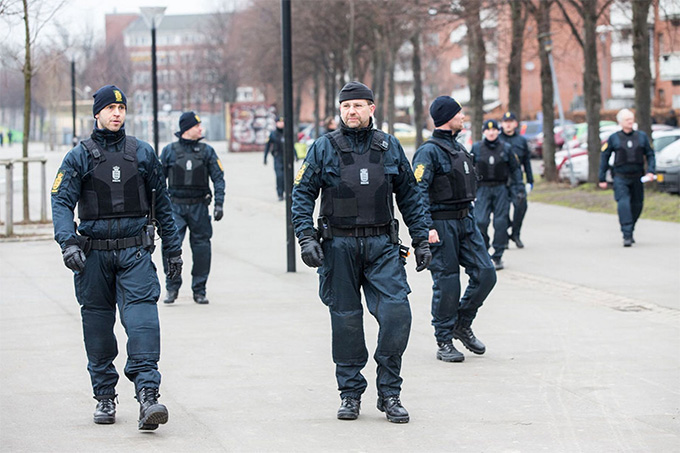
Police continue their search for evidence in Copenhagen after alleged gun man Omar Abdel Hamid El-Hussein shot dead two people and injured five police officers
“People assume you don’t know anything about the world just because you’re a gang member. He knew all about current affairs, especially about Israel and Palestine. But Omar was tough. He wasn’t afraid of violence.”
Two men appeared in a Copenhagen court yesterday charged with complicity in the killings and helping obtain weapons for El-Hussein. Two others arrested are yet to appear. Police said “other perpetrators may be at large”.
Where did they get the weapons from?
One woman who was inside the synagogue where security guard Dan was killed told how more than 50 children attending a 12-year-old girl’s Bat Mitzvah cowered in the basement as El-Hussein launched his attack.
Eva Blum said armed police burst into the building and ordered everyone to flee. She added: “Each one of the adults took a child, or several children in hand. Imagine what it is like to run with a shoeless child, through roads full of armed policemen. It is frightening.”
Denmark’s chief rabbi branded Israeli PM Benjamin Netanyahu’s call for the “mass immigration” of European Jews to his country in the wake of the Islamic attacks “disappointing”.
Jair Melchior said: “If the way we deal with terror is to run elsewhere, we should all run to a deserted island.”
And after 300 Jewish graves were desecrated in eastern France, PM Manuel Valls told the country’s Jews: “We do not want you to leave.”
mirror.co.uk
Once again we are asked to take the side of the Muslims or the Jews. We don't have to take either side. We are Europeans and this problem is not ours, it is completely unnecessary to ask of us to spend endless resources, time, effort and emotional concern to "fight global terrorism." These issues have been imported into European countries by those who have advocated open borders and mass immigration into European countries. Stay out of the dialectic trap and take a third position!
More: Jyllands-Posten Editor Flemming Roses’ Slightly Crippled Plea For Freedom Of Speech.
Bio of Copenhagen gunman Omar Abdel Hamid El-Hussein
NAME: Omar Abdel Hamid El-Hussein
AGE: 22
BORN: September 1992, in Denmark, to Palestinian parents, according to Danish media.
RAISED: In the Copenhagen area with his parents (now divorced) and a younger brother, Danish media say.
SCHOOL: Attended VUC vocational school in Copenhagen suburb of Hvidovre. Headmaster Peter Zinkernagel told Danmarks Radio "he was a very skilled and clever student who did well," but was expelled after being charged with stabbing a train passenger in November 2013.
CRIMINAL RECORD: Convicted in December 2014 of aggravated assault in the stabbing, sentenced to time served.
HOBBY: Martial arts at the Copenhagen Muay Thai boxing club. Fellow boxer Jacob Dyngbo Paaske, who filmed el-Hussein fighting bouts, says el-Hussein was "a silent type," and "very intense when he fought."
NICKNAME: "Little Hussein from the Square," an ironic reference to his 6-foot, 2-inch (188 centimeter) height and Blaagaardsplads, a square in the Noerrebro district that was a hangout for a gang of immigrant boys who turned criminal, according to a source with knowledge of the criminal gang environment in Copenhagen.
GANG: Loosely connected to Blood and Brothers, the source said, speaking on condition of anonymity because he was not authorized to discuss ongoing police investigations.
Source: news.yahoo.com
Obviously this is Denmark's fault ...somehow.
Danes fear youth gangs are melding with extremism
From: washingtonpost.com
With baseball caps pulled low over their eyes and scarves wrapped tightly around their mouths, the young men huddled at sundown to pay tribute to a killer.
Dozens had come to the scene where their “brother” was shot dead by police after he sprayed gunfire outside a cafe and a synagogue. Now they would give him a proper — and defiantly public — send-off: quiet prayers, followed by repeated chants of “Allahu Akbar” and the raised-index-finger salute of the Islamic State.
“May Allah show you grace,” read the handwritten sign they taped to the bullet-scarred apartment building where 22-year-old Omar Abdel Hamid el-Hussein fell. “Rest in peace, Captain.”
Hours later, an estimated 30,000 Danes held torches to the freezing Baltic wind in their own Monday evening commemoration — this one for Hussein’s victims. Swaying to the rhythm of John Lennon’s “Imagine,” they vowed not to bend to the impulse to terror that drove the gunman to take two lives over the weekend in the country’s first fatal terrorist attack in three decades.
“When violence and hatred hits Denmark, the answer is community and democracy,” Prime Minister Helle Thorning-Schmidt told the solemn crowd.
But the earlier, far smaller gathering offered ominous hints of just how long and difficult this country’s struggle with violent extremism may prove to be.
Danish Foreign Minister Martin Lidegaard told the BBC that the weekend’s attacks were believed to be the work of a “lone wolf,” a troubled young man who had already had multiple run-ins with the law and who had not acted in concert with a broader terrorist cell.
But authorities said Hussein was part of a network — a criminal gang called the Brothas that has traditionally traded in drugs and theft but whose members have lately been lured by radical Islam.
Like Hussein, many are the sons of Middle Eastern immigrants who have struggled to find a place in Denmark. These young men turn to the bonds of gang life and religion to forge their identities.
“The Brothas is dominated by young men without an education who feel they are not accepted in society,” said Aydin Soei, author of “Angry Young Men,” a book about gangs and inner-city life in Copenhagen. “They are not good Muslims and they know it. But Islam is part of their identity. They have a group identity of everyone being against them and being underdogs. In that identity, Islam means something.”
Soei said he thinks he met Hussein in 2011 while conducting research in Norrebro, the ethnically and socioeconomically diverse north Copenhagen neighborhood where Hussein lived – and, in the hours before dawn Sunday, died.
A group of Brothas members he had run into asked Soei where he was from — and were instantly suspicious when he mentioned another Copenhagen neighborhood that’s home to a rival gang.
“They were really not happy about that,” Soei said. “That tells a lot about the gang war in Copenhagen.”
Turf battles over drugs and pride have led to sporadic outbreaks of violence. But they have mostly been limited to fistfights and the occasional stabbing.
“The gangs around here would get wiped out in one day by even some mediocre gang in the United States,” said Adeel, manager of a Norrebro Internet cafe. He declined to give his last name because he did not want the attention.
The cafe was raided Sunday by police who believe Hussein may have paid a visit in between his attacks Saturday afternoon. Police arrested and charged two people who they believe may have helped Hussein by “giving advice and assistance in connection to the shooting,” a police spokesman said.
Adeel said he did not know Hussein but that gang members are occasional visitors to the Internet cafe — and often engage in petty neighborhood crime. “They’re local punks,” he said.
Lately, however, Copenhagen’s gangs have taken on a more troubling cast as the line between criminality and extremist ideology has blurred.
Copenhagen gang leaders are among at least 110 Danes who have ventured to Syria and Iraq to fight in those countries’ wars. Intelligence services have stepped up monitoring of the groups’ activities for fear of the sort of domestic terror attack that played out over the weekend.
Hussein had been on law enforcement’s radar for years, having graduated from small-time weapons charges to an assault conviction after stabbing a teenager on a commuter train in November 2013.
He was released from prison just two weeks before the weekend’s rampage, and Danish media reported Monday that prison officials had warned the country’s main security service that he might have become radicalized during his jail term. The security service, P.E.T., would not comment on that claim and has declined to say whether Hussein was under surveillance before the killing spree.
His first target Saturday was a free-speech forum convened by Lars Vilks, a Swedish cartoonist who has been repeatedly targeted by radical Islamists for depicting the Prophet Muhammad. His second was the Great Synagogue of Copenhagen. In each attack, one civilian was killed and police officers were credited for preventing many more deaths.
The idea of Hussein as a terrorist was one that those who knew him in Norrebro said they had trouble squaring with the quiet and calm man they had known.
At the Thai kickboxing club where Hussein worked out and competed, his trainer said he was stunned by the suggestion that his onetime protege had been behind the killings.
“He didn’t talk too much, but he was a cool guy,” said the trainer, who declined to give his name because he did not want to be associated with violence. “Women train in here. Danes train in here. He was cool with everyone.”
Hussein came from a family of Palestinians who moved to Denmark from Jordan. He spent at least part of his upbringing in Mjolnerparken, a set of state-subsidized red-brick apartment blocks.
The area is known to many Danes as a low-income ghetto, but it is packed with well-maintained playing fields, parks and community centers — all products of a substantial government investment.
The area is also a haven for the Brothas.
After paying their respects Monday evening at the spot where Hussein was killed, the young men — many no older than their late teens — walked en masse back to Mjolnerparken. At least a dozen police carrying assault rifles followed from a wary distance.
“There’s only one terrorist, and that’s the guy who drew the prophet,” said Adnan Abdec, a 29-year-old Muslim who was not with the group but who watched its actions approvingly. “He made 1.5 billion people angry. If you push Muslims, it’s going to come back to you.”
Across the street, gray-bearded Shaker al-Abadi could only shake his head and wonder what’s in store for the country that welcomed his family after they fled Iraq 24 years ago.
“I’m Muslim, but I can’t understand what I’m seeing,” said the 63-year-old shopkeeper. “Why is this happening? I’m afraid it won’t stop.”
From: washingtonpost.com






















